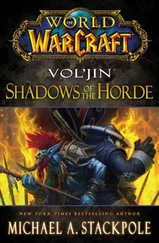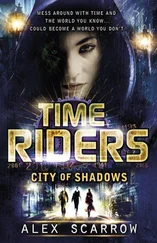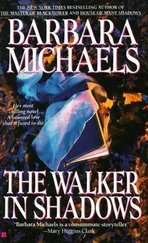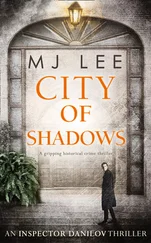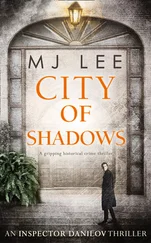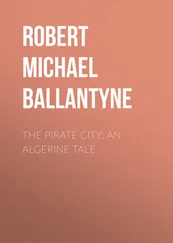Michael Russell - The City of Shadows
Здесь есть возможность читать онлайн «Michael Russell - The City of Shadows» — ознакомительный отрывок электронной книги совершенно бесплатно, а после прочтения отрывка купить полную версию. В некоторых случаях можно слушать аудио, скачать через торрент в формате fb2 и присутствует краткое содержание. Жанр: Исторический детектив, на английском языке. Описание произведения, (предисловие) а так же отзывы посетителей доступны на портале библиотеки ЛибКат.
- Название:The City of Shadows
- Автор:
- Жанр:
- Год:неизвестен
- ISBN:нет данных
- Рейтинг книги:5 / 5. Голосов: 1
-
Избранное:Добавить в избранное
- Отзывы:
-
Ваша оценка:
- 100
- 1
- 2
- 3
- 4
- 5
The City of Shadows: краткое содержание, описание и аннотация
Предлагаем к чтению аннотацию, описание, краткое содержание или предисловие (зависит от того, что написал сам автор книги «The City of Shadows»). Если вы не нашли необходимую информацию о книге — напишите в комментариях, мы постараемся отыскать её.
The City of Shadows — читать онлайн ознакомительный отрывок
Ниже представлен текст книги, разбитый по страницам. Система сохранения места последней прочитанной страницы, позволяет с удобством читать онлайн бесплатно книгу «The City of Shadows», без необходимости каждый раз заново искать на чём Вы остановились. Поставьте закладку, и сможете в любой момент перейти на страницу, на которой закончили чтение.
Интервал:
Закладка:
‘Well, if determination was all there was to it, Sergeant — ’
‘Meaning what?’
‘Adolf Mahr drove Keller to Dun Laoghaire last night and put him on the mail boat. He’ll be in London by now, I’d say on his way to Germany.’
Lieutenant Cavendish got out at Naas, where the train took the branch line that led along the River Slaney and the western edge of the Wicklow Mountains to Baltinglass. And as the train set off again Stefan Gillespie took out the letters Hannah Rosen had given him. Immediately he found himself in a world that was complex, intense and unfamiliar. Naturally enough, the letters between two old and close friends were full of epigrammatic references to people and events he could know nothing about, both in the lives they had shared in Dublin and in the lives they now led in Ireland and Palestine. As a detective he had tried to piece together the jigsaw of a stranger’s life before, but this had an intimacy that at once absorbed him and made him uncomfortable. Susan Field almost certainly wrote as she spoke. Her words tumbled over each other and took tangential, unlooked for directions, sometimes finding their way back, circuitously, to what she had started speaking about, sometimes leaving the original thought behind, never to return. Several times she made him laugh out loud — once when she described sitting in the gallery of the Adelaide Road synagogue on a Saturday morning, mesmerised by a man who had fallen asleep below, wondering how long it would be before the growing intensity of his snores would be loud enough to compete with the cantor’s recitation of a psalm; another time, when she kept patting the packet of cigarettes in her coat pocket to reassure herself that soon, very soon, she would be outside the synagogue drawing in the invigorating smoke that was all the more desirable because it was forbidden on the Sabbath. It reminded her, she wrote, of the time she and Hannah, just seventeen, tore along the South Circular Road after shul to light a cigarette in a doorway, only to meet the pious and disapproving faces of Mrs Wigoder and Mrs Noyk. He could feel the vitality of Susan Field in her breathless words; it brought him closer to the loss that consumed Hannah. It wasn’t hard. His own loss wasn’t buried very deep.
The letters were punctuated by words Stefan didn’t quite understand, but every so often there was something familiar about the closeness of a community that was both a part of the world around it and at the same time engaged in its own private rituals and habits. Catholic Ireland was a public event, but his own childhood, especially the teenage years, when his Sunday mornings still belonged to the Church of Ireland, didn’t feel very different to some of Susan Field’s memories. There was the same mix of boredom, irritation and impatience; there was the same sense of something apart. He looked out of the window, seeing the water of the Slaney for the first time, and to the east the round-topped Wicklow Mountains. He played no part in all that now. He couldn’t remember when he last sat in the church by the river in Baltinglass. Yet he still knew that what his father always said was true; it wasn’t just a more private way of looking at the world; it was about keeping your head down. His parents still did keep their heads down.
By the end of the first few letters Susan Field’s swirling narrative had moved from the past to new excitement about being at University College Dublin. He knew her better here. And he still felt the closeness between her and Hannah. There was a letter that ended with a paragraph of invective about a priest who was lecturing on medieval philosophy. He was arrogant, supercilious and never listened to what anybody else said. Fierce intelligence and blind faith. Didn’t the first mean you shouldn’t be a prisoner of the second? How could you argue with someone whose ideas admitted no doubt? In the letters that followed, her irritation with the man she started to refer to jokingly as ‘John’ was replaced by an admiration that was already about something else altogether. She had done more than find his doubts.
He came to the pub with us. I don’t know why. He never did before. I started arguing with him, mostly about how his lectures infuriated me. But he wasn’t as stuffy as the stuff he spouts. I don’t mean he doesn’t believe things I could never believe, but he was so much sharper and funnier than in college. He’s full of questions about what he believes after all. He’s obviously committed to being a priest, but he said he wasn’t sure he would have become one, if he’d thought the way he thinks now. Anyway, we ended up talking on our own, after the others all went. And when the pub closed we walked round Dublin for hours and hours, just talking and talking. I think he’s probably a bit of a mess underneath. I quite like that really!
Soon the world of the family and friends Hannah and Susan shared had almost disappeared from the letters; so too had the references to what Hannah’s letters must have contained about her life in Palestine. Stefan was very aware of that. He found himself scanning the later letters, not for the pieces of the jigsaw he was actually meant to be putting together, but for the pieces of the other one, the one that was about Hannah Rosen. Sometimes there was still a glimpse of that, buried among her friend’s preoccupations.
When I met John tonight we didn’t talk very much. We finally did what we’d both wanted to do at the end of that first night, when we walked through Dublin. You always tell me I use the word love too easily. You don’t even like using it when you’re talking about Benny, and you’re marrying him! Tell me which of us is the more confused? Anyway, I’ll pretend I’m not talking about love even if I am. You’re the only person I can say all this to. I quite like how secretive and exciting it all is. Sounds a bit daft of course. I know you’ll think so! But then you’ve got a nation to build. You’ve got to be serious. I don’t suppose it’ll last long — after all he is a priest! It’ll get a lot less exciting once guilt catches up with him. But just now he hasn’t got time!
As the letters went on they were less and less about excitement and more about unhappiness and isolation — from her family and her community, even from the friends she had at UCD. It seemed to Stefan as if some of the things Susan said suggested that Hannah reciprocated those feelings at times — not of unhappiness perhaps, but at least of uncertainty. Soon, however, there was scarcely any room in Susan Field’s letters for anybody else, even her best friend. And then, in middle of it all, she found out she was pregnant.
Well, I told him. He started on about leaving the priesthood and meeting his obligations. God, the only thing worse than the mess I’m in is the thought of a lifetime with a man who’s ‘meeting his obligations’. I just shut him up, but then he surprised me. He asked me if I wanted to keep the baby, and when I told him I didn’t, he said he’d help. There’s a man in Merrion Square, a proper doctor I think, German, all very private and swanky. He knows somebody John knows. I don’t know how. I can’t say I care. I’ve seen him and it’s all very easy. It’ll be sorted out next week. John and I won’t see each other again. He’s leaving UCD. It seems a long time since we felt happy with each other. I’m not sure we ever did, whatever we told ourselves.
The last two letters were much shorter. The animation that had filled the others, even when she was writing about unhappiness, had been drained out of her. There was only emptiness. Now she just wanted it over with.
Merrion Square tomorrow. I don’t know what then. It was all about nothing in the end. In between I seem to have lost touch with all the things I cared about. I can’t even remember what they were. I’m a long way from everyone. I wish you were closer, Hannah. I suppose the blues are inevitable. But they’ll go, I guess. By the way, if I use the word love too much, you don’t use it enough. If you don’t love Benny, then making the desert bloom and filling it with babies won’t be enough. I don’t know so much about myself any more, but I know that about you. Anyway, here I go!
Читать дальшеИнтервал:
Закладка:
Похожие книги на «The City of Shadows»
Представляем Вашему вниманию похожие книги на «The City of Shadows» списком для выбора. Мы отобрали схожую по названию и смыслу литературу в надежде предоставить читателям больше вариантов отыскать новые, интересные, ещё непрочитанные произведения.
Обсуждение, отзывы о книге «The City of Shadows» и просто собственные мнения читателей. Оставьте ваши комментарии, напишите, что Вы думаете о произведении, его смысле или главных героях. Укажите что конкретно понравилось, а что нет, и почему Вы так считаете.

